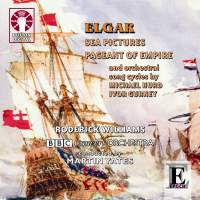 On Saturday I was in Gloucester, not this time to work in the archive but to sing a concert at the Cathedral. Having a few hours between rehearsal and performance, and being set at liberty with a motor-carriage, I ventured across the Severn to Maisemore in the hope of finding firstly the home of Gurney's paternal grandparents, and then to see what, if any, Gurneys were at rest in the churchyard.
On Saturday I was in Gloucester, not this time to work in the archive but to sing a concert at the Cathedral. Having a few hours between rehearsal and performance, and being set at liberty with a motor-carriage, I ventured across the Severn to Maisemore in the hope of finding firstly the home of Gurney's paternal grandparents, and then to see what, if any, Gurneys were at rest in the churchyard.One of Gurney's letters of 1927 gives the address of his grandmother, whom he visited weekly with his father, David, walking across the bridge at Over and through the meadows to the village. In spite of this information, and with a half remembered image of the house in my mind from the only surviving photograph of the house and his grandmother, I was unsuccessful in this, my first 'pilgrimage'. However, in the churchyard, I found at the south east corner of the church the grave of his grandparents, the headstone marking which is beginning to suffer from decay. His grandfather died in 1875, 15 years before Gurney was born. His grandmother lived until 191? (the last character of the date is eroded); to the ripe age of 90.


 This week sees the release of a new Gurney CD: a recording of his Edward Thomas 'book' (as he called it in a letter of 1925) of songs, Lights Out - a set compiled by Marion Scott for publication by Stainer & Bell in 1926. Although compiled at this time, it consists principally of settings made in 1918 and 1921, with the exception of the last, 'The Trumpet', which was written in July 1925 especially for the volume (a second setting composed at this time, 'Words', was also intended for the set, although it never made it into the volume).
This week sees the release of a new Gurney CD: a recording of his Edward Thomas 'book' (as he called it in a letter of 1925) of songs, Lights Out - a set compiled by Marion Scott for publication by Stainer & Bell in 1926. Although compiled at this time, it consists principally of settings made in 1918 and 1921, with the exception of the last, 'The Trumpet', which was written in July 1925 especially for the volume (a second setting composed at this time, 'Words', was also intended for the set, although it never made it into the volume). 

